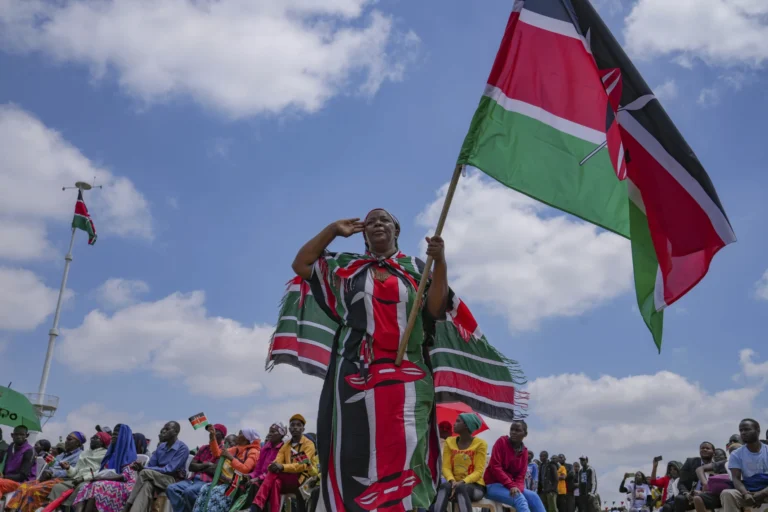Yaounde, Cameroon – The Catholic Church in Kenya is sounding the alarm over the poor performance of the National Health Insurance Fund (NHIF), the state-owned company that provides Universal Health Coverage (UHC) to Kenyans through health insurance.
Bishop Norman Kingu Wambua, who spoke during a diocesan pilgrimage at the Komalock Shrine in Machakos Diocese, said the NHIF was dysfunctional and the public body was bringing down Catholic hospitals due to unpaid bills. he accused.
“Where is the money?” Wambua asked rhetorically during the February 10 event. “I don’t know what happened, but I don’t have any more money.”
The bishop said the debt NHIF owed to the Catholic Church was alarming.
“They are completely paralyzing our hospitals,” Wambua said.
He said NHIF owes his parish hospital, Bishop Kioko Catholic Hospital, about $540,000.
The bishop added that this debt is hampering hospital operations and impacting the quality of care for patients.
He appealed to political leaders to intervene and ensure that NHIF pays dues to church health facilities serving both Catholics and non-Catholics.
“What should we do? Dear politicians, can you please answer where that money went? Tell us where that money went and treat our believers and others. Please bring it back so we can,” Wambua said.
The Kenya Conference of Catholic Bishops (KCCB) also raised concerns about the inefficiency of the NHIF in November 2023.
In a statement after its General Assembly at St. Mary’s Pastoral Center in the Diocese of Nakuru, the Bishops’ Conference said missionary health institutions had a large amount of unpaid dues from the NHIF and the fund was not functioning well.
They say they are concerned about the large number of outstanding reimbursements to mission health institutions, which is constraining the church’s ability to continue providing health care to millions of Kenyans, especially in rural areas. he pointed out.
broken system
Kenyan Minister of Health Susan Nakumicha said on June 10, 2023 that NHIF is in financial difficulty as a result of the national financial collapse.
Records show that 8.8 million of NHIF’s 15.4 million members were behind on their monthly contributions in January. This represents a significant increase in the number of dormant members compared to the previous year, when 5.03 million members were behind on their payments.
The country’s macroeconomic situation has also forced companies to cut employee salaries and, in some cases, close down completely. This resulted in many members defaulting on their debts, making the scheme unsustainable.
The available funds have also fallen victim to corrupt networks, with Nakmicha’s recent report showing that fraudsters were aiding in biometric identification.
According to the report, about 47% of hospitals accredited by the NHIF reactivated dormant insurance accounts, fabricated health insurance claims, and deceived information obtained from other sources to obtain fraudulent payments. They claim that many of the payments were made to patients who made false payments, using fraudulent techniques and biometrics. He claims to have undergone major surgery.
These corrupt schemes resulted in a staggering $126.4 million in losses, although approximately $1 million has already been recovered.
Movement towards reorganization
Recently, President William Ruto said he was launching a new plan to replace the ailing NHIF. The country’s Ministry of Health said on ‘X’ (formerly known as Twitter) that the Kenyan government “has made @nhifkenya a public service to ensure that Kenyans have access to quality and affordable healthcare. “We are reorganizing it into the Social Health Insurance Fund (NSHIF).” Kenya Kwanzaa manifesto to achieve universal health coverage for all. ”
The system is scheduled to be operational in March 2024, but Catholic bishops fear that rushing it will only make things worse.
According to KCCB, implementing the new program without thoroughly diagnosing and resolving the problems that plagued the previous program could further worsen the condition of Kenya’s health facilities.
“Paying for medical expenses such as surgeries, treatments, and medications helps ensure that individuals receive the medical services they need, improving health outcomes and quality of life,” the bishops said. He said he is trying to emphasize the role of mechanical medical services. In the country.
“Among many faith institutions, Catholic missionary hospitals still have obligations. [millions of dollars] By NHIF. We remain anxious about what will happen after the planned reorganization of the NSA. There needs to be a clear plan to pay these arrears,” KCCB said.
The Catholic Church in Kenya operates more than 500 health facilities across the country. It is one of NHIF’s key partners in providing healthcare to Kenyans, especially the poor and vulnerable.


